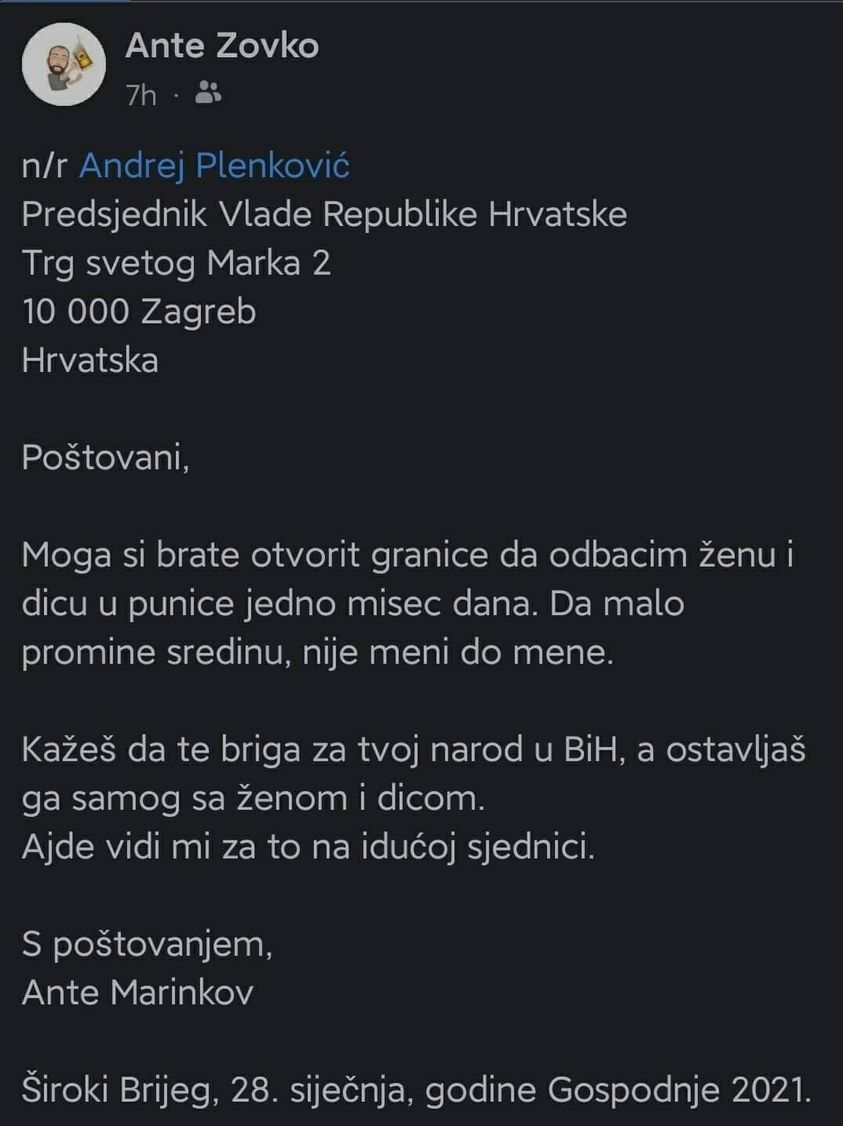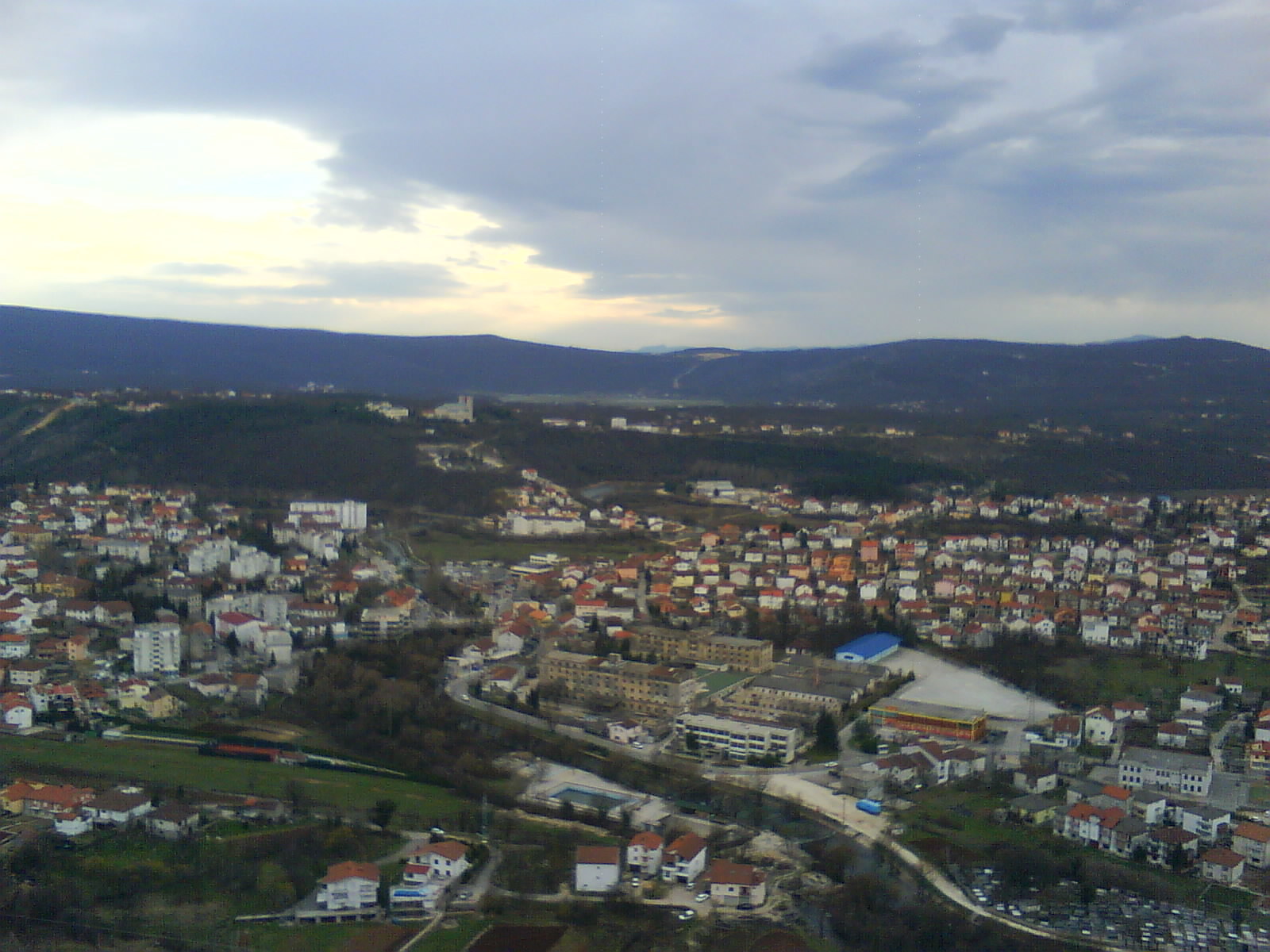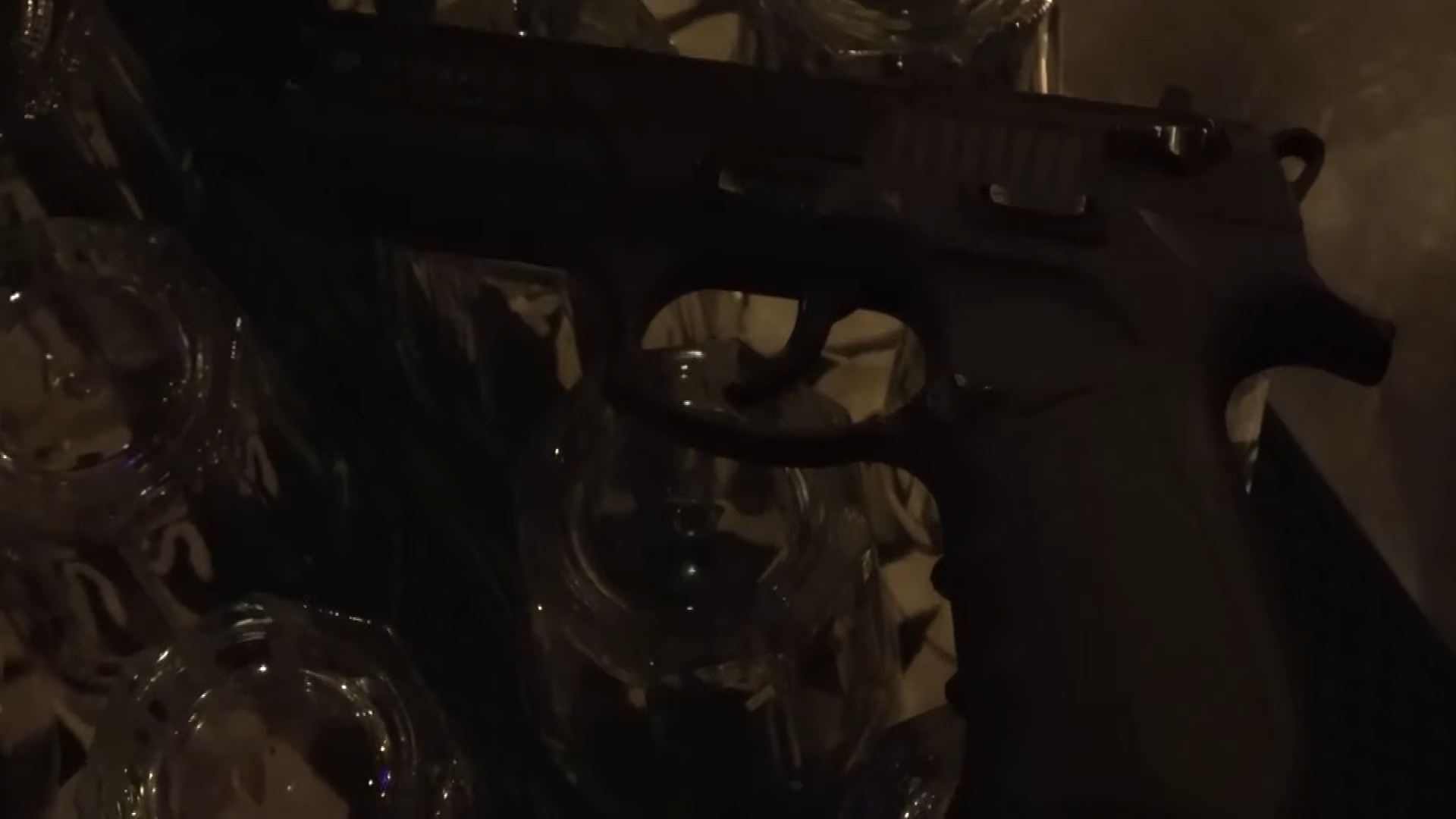Zagreb Cafes Protest Opening 1st Feb Cancelled, Fines Too Severe
January 31, 2021 – The planned cafes protest in Zagreb and elsewhere, which was due to see 100 facilities open their doors on Monday 1st February in defiance of the current ban on their operations, has been cancelled. Huge fines and the threat of prison are the reason for the climb down. Minister of Economy and Sustainable Development Tomislav Coric appealed to caterers for patience.
The proposed Zagreb cafes protest organised for Monday 1st February has been cancelled. The protest was due to see some catering facilities and gyms open their doors to the public in defiance of the current nationwide ban on operations in such facilities. Around 100 businesses were said to be joining the Zagreb cafes protest.
"Although it has been rumoured that more than 100 caterers in Zagreb will open their facilities on February 1, mostly cafes, or at least start issuing coffee and drinks outside, despite the work ban, it does not seem this will (now) happen, as many have withdrawn after seeing all the consequences that could befall them if they do, " Franz Letica, president of the Zagreb Caterers' Association, told Hina by telephone after the meeting.
On Friday 29 January, the Association of Caterers in Zagreb announced the opening of at least 100 bars and Croatian cafes would open on Monday. An informal meeting of caterers, many who were due to take part in the cafes protest, took place on the afternoon of Saturday 30 January. It seems that at the meeting, plans for the cafes protest fell apart. Caterers had faced the possible punishment of fines - from 20 thousand kuna to 70 thousand kuna - and up to three years in prison for defying the law and opening during the cafes protest.
Petra Odobašić, the owner of a catering facility from Zagreb who attended Saturday's informal meeting, also confirmed to Hina there would be no mass opening on Monday, but that only a dozen caterers would continue with the cafes protest. This handful of establishments were described as being situated mostly in the Dubrava area of Zagreb. Around 80 caterers attended Saturday's informal meeting, mostly from Zagreb, but some from other areas such as Karlovac.
Appearing on Croatian television on Saturday 30 January, Minister of Economy and Sustainable Development Tomislav Coric appealed to caterers for patience.
"We hope there will be (patience)," he said when asked about the proposed act of defiance, "given that we have explained the epidemiological situation we are currently in. We need to think about the season - spring and summer - this will be the time when we can all reap the fruits of responsibility together."
COVID-19 Update: 551 New Infections, 26 Deaths
ZAGREB, 30 January, 2021 - In the last 24 hours Croatia has registered 551 new coronavirus cases and 26 related deaths, the national coronavirus response team reported on Saturday.
A total of 1,249 patients are hospitalised, including 113 on ventilators.
The number of active cases currently stands at 3,075 and 15,700 people are in self-isolation.
Since 25 February 2020, when the first case of the infection was confirmed in the country, 232,090 people have been infected with the virus, of whom 4,998 have died and 224,017 have recovered, including 567 in the last 24 hours.
A total of 1,186,046 people have been tested for the novel virus to date, including 5,195 in the last 24 hours.
Number of Deaths 13% Higher Due to COVID
ZAGREB, 29 January, 2021 - Croatia registered 13.2% more deaths in March-December 2020, during the COVID-19 pandemic, than at the same time in 2019, the national statistical office said on Friday, adding that year on year the number of deaths in December alone jumped by 77.3%.
In 2020, 8.3% more deaths (+4,350) were registered than in 2019. From March through December, the number of deaths was up by 13.2% (+5,523).
The largest number of deaths in Croatia in a month was registered last December, a total of 7,395, which was up by 77.3% from December 2019 (+3,225).
The second largest number of deaths in a month was registered in January 2017, a total of 6,512, while the third was in January 2019 (5,504).
January and March have been the other months with the most deaths but they have not exceeded 5,500.
Croatia Confirms 561 New Coronavirus Cases, 29 Deaths
ZAGREB, 29 January, 2021 - Croatia has registered 561 new coronavirus cases and 29 related deaths in the last 24 hours, the national coronavirus response team reported on Friday morning.
The number of active cases currently stands at 3,117 and among them are 1,286 infected persons receiving hospital treatment, including 121 who are on ventilators. A total of 15,389 people are in self-isolation.
A total of 1,180,851 people have been tested for the novel virus to date, including 5,020 in the last 24 hours.
Since 25 February 2020, when the first case was confirmed in the country, 231,539 people have been infected with the virus, of whom 4,972 have died and 223,450 have recovered, including 588 in the last 24 hours.
Hercegovac Begs Cro PM 'Open Borders So I Can Send My Wife To Her Mother'
January 29, 2021 – Lockdown is apparently taking a toll on one Hercegovac. The man from Široki Brijeg wrote to Croatian Prime Minister Andrej Plenković and begged him to reopen the borders between Croatia and Herzegovina so he could eject his wife from the family home for a month and send her to his mother-in-law's
The message from Hercegovac Ante Zovko (Ante Marinkov) was reposted on the Facebook page Imocki crnjaci where it picked up some 3 thousand likes in less than 6 hours.
The town, Široki Brijeg, where this particular Hercegovac (a man from Herzegovina) lives is just 35 kilometres from the border with Croatia. Lots of Croatians live in this area, including this Hercegovac, his wife and his child. But not, it would seem, his wife's mother, who apparently lives in Croatia. Široki Brijeg in Herzegovina, around 35 kilometres across the border from Croatia © Anto (talk)
Široki Brijeg in Herzegovina, around 35 kilometres across the border from Croatia © Anto (talk)
The Hercegovac's reason for wishing to eject his wife and child for a month was to change up the atmosphere for a time. One presumes he was not being entirely serious with his request.
The Hercegovac is not the first man to seemingly reach the end of his tether while restricted to staying in the family home. In April 2020, after just one month of being housebound, a man from a village near Osijek in Slavonia left his wife in the family home and went to live nearby in a tent.
Speaking anonymously at the time, the man's neighbour told the local SiB.hr news portal the couple have been happily married for 30 years. But, it seems the pressure of being around each other so closely during the lockdown was too much even for their strong union.
The neighbour was happy to report that since his friend pitched his tent in the nearby locale, relations between the man and his wife had actually returned to their usual levels of warmth and friendliness. The wife even came regularly to visit her husband in his tent. © John Waring
© John Waring
"My neighbour has been in his tent for a few days now,” he told the portal back in April. “He puts up a table and chairs in front. Occasionally our other neighbour comes over to drink some rakija (with him). I visited him too.”
The neighbour said his friend had quit the family home due to boredom more than anything else. Even after being happily married for 30 years, being around each other 24 hours a day was apparently just too much.
Perhaps in this more chivalrous response from the Slavonian man, Hercegovac Ante Marinkov could take some inspiration? After all, it's surely easier if one person departs from his family home in order to change the atmosphere than if two are forced to leave. Ante should find a nice spot in the fields nearby – not too close – and simply pitch up a tent. Problem solved! If he's lucky, his wife might come to visit bringing rakija.
VIDEO: Prohibition-Era Nightclubbing Zagreb, 33 Fined
January 29, 2021 – It has all the ingredients of a movie about Al Capone or Lucky Luciano in 1920s Chicago - illicit, hidden drinking dens, dancing girls, bullets, guns, gangsters and a police raid, only with a neon lighting scheme that remains fashionable strictly in Balkan clubs. Welcome to Prohibition-era nightclubbing Zagreb
It has all the ingredients of a movie about Al Capone (main picture) or Lucky Luciano in 1920s Chicago - illicit, hidden drinking dens, dancing girls, bullets, guns, gangsters and a police raid, only with a neon lighting scheme that remains fashionable strictly in Balkan clubs. Welcome to Prohibition-era nightclubbing Zagreb.
Croatian police have issued a video of a raid they undertook to shut down a Prohibition-era nightclubbing party in Zagreb. Inside the venue, they found 33 persons. None were wearing masks.
One young man at the party was caught with a pistol and bullets. If it weren't for the police's modern helmets with visors and the Balkan-cool neon lighting, you could be forgiven for thinking you were watching Eliot Ness and The Untouchables busting an illegal speakeasy. All cafes, restaurants, bars and nightclubs are supposed to be closed at the moment under measures adopted to counter the spread of Coronavirus. The pistol found by police while conducting a search on a 24-year-old at the club - Youtube screenshot
The pistol found by police while conducting a search on a 24-year-old at the club - Youtube screenshot
In the original era of America's Prohibition, under which the production, import, transportation, and sale of alcoholic beverages was illegal, Al Capone ultimately received an 11-year prison sentence for tax evasion and Lucky Luciano was looking at 30 - 50 years until he struck a deal and agreed to be deported to Italy. Thankfully, there are no mafia murders connected to this tale of Prohibition-era nightclubbing in Zagreb.
In addition to the video, the police released a statement about the prohibition-era nightclubbing raid:
"During the operation, a total of 33 people were found, identified and checked in said facility. No coercive measures were used during the actions of the police officers. 33 people were found not wearing protective masks, which is why the police officers issued them three Notices of Misdemeanor and 30 fines were collected for violations of Article 47, paragraph 2, item 9 of the Law on the Protection of the Population from Infectious Diseases.
Furthermore, for one of the caught persons, a 24-year-old was searched and a gas pistol was found in his possession, for which he was issued a Mandatory Misdemeanor Order for the offence under Article 27, paragraph 2 of the Law on procurement and possession of weapons by citizens. Bullets found by the police at the prohibition-era nightclubbing scene in Zagreb
Bullets found by the police at the prohibition-era nightclubbing scene in Zagreb
Also, officials of the Directorate of Civil Protection found violations of epidemiological measures contrary to the Decision on necessary epidemiological measures restricting gatherings and introducing other necessary epidemiological measures and recommendations to prevent the transmission of Covid-19 through gatherings. Due to performing catering activities contrary to the decisions of the Civil Protection Headquarters, officials of the State Inspectorate, Tourist Inspection, Zagreb Regional Office found a violation of Article 9A of the Catering Act and issued an oral decision banning the work, and the facility was sealed for at least 30 days. Misdemeanor proceedings will be initiated against the legal and responsible person.
As part of the criminal investigation, the 45-year-old owner of a catering facility was taken to the official premises of the Zagreb Police Administration for a criminal investigation on suspicion of having committed the criminal offence of "Spreading and Transmitting an Infectious Disease" under Article 180. He will be handed over to the custody supervisor after the criminal investigation is completed”
Prohibition in the United States took place in a 13 year period between 1920 and 1933. It is highly unlikely that the bars and cafes of Zagreb will be asked to remain closed for such a length of time. This is not the first instance of Prohibition-era nightclubbing taking place irrespective of epidemiological guidelines in Zagreb. In late November 2020, Croatian media (including Juarnji List) widely reported on police raids that took place at two Zagreb venues, even though measures adopted in the fight against the pandemic were at that time more relaxed.
Božinović: There Will Be No Major Relaxation of Epidemiological Restrictions
ZAGREB, 25 January, 2021 - The national COVID-19 response team is considering the relaxation of the ban on gatherings as of February 1 but there will be no major relaxing of epidemiological restrictions, the team's head, Minister of the Interior Davor Božinović said on Monday, ahead of the adoption of a new set of measures.
"There will be no complete lockdown in Croatia as in some other European countries but there won't be any major relaxation of the restrictions either. We need time to see what happens with the new virus strains," Božinović said.
The current restrictions are in force until the end of this week and before they expire, a new set of measures will be made known, with three restrictions regarding commerce, borders and public transportation likely to be extended, while the relaxation of the ban on gatherings is being discussed the most.
"In the current situation, there is not much room for a strategy of major relaxation of the restrictions. The worst thing would be to open something suddenly and then to have to close it down again," he said, noting that statistics on the number of new infections were better and better but that those number were not insignificant.
Future decisions will be impacted by the spread of the new virus strains which have already appeared in Croatia's neigbourhood, by the slowing down of the vaccination process and the fact that we are still in the winter period, he added.
As for plans by cafe and restaurants owners to stage a protest against anti-epidemic measures, Božinović said that protests were a democratic instrument but that he did not know against whom and what they would protest as restrictions had not been introduced with the intention of making someone's life harder.
"We all hope that as the number of new infections declines and vaccination proceeds some kind of normal life will be restored but it is clear that it won't happen tomorrow," he said.
Markotić: We can't be sure mutated viruses are not already in Croatia
The head of Zagreb's Dr Fran Mihaljević hospital for infectious diseases, Alemka Markotić, said that the situation regarding virus mutation was being seriously followed and that one could not be absolutely sure that the mutated viruses had not already appeared in Croatia.
"There are for the time being no hotspots with an extreme increase in the number of new infections, which is an indirect indicator that the mutated virus, even if it has arrived in Croatia, is not replicating significantly. There will be more mutations in the future but they need not necessarily be bad for humans. Mutations more often harm the virus than they increase its contagiousness. The situation will be followed," said Markotić, noting that existing PCR tests can detect the British virus strain.
Capak: Croatia will not engage in bilateral talks with vaccine producers
Croatian Public Health Institute (HZJZ) head Krunoslav Capak said that Croatia was registering a 20% decrease in the number of new infections in the last seven days compared to the week before.
A total of 69,984 persons have been vaccinated and 11,907 have been revaccinated, he said.
For those who need a second shot, vaccination will be postponed for a week due to lack of the vaccine but that will not affect the quality of vaccination or immunity as the second shot can be received up to 42 days after the first one, he said.
He noted that Croatia did not plan to hold bilateral talks with vaccine producers as a common approach had been agreed at EU level but stressed that in the next four weeks Croatia would obtain 14 fewer boxes of the vaccine or 13,650 fewer doses.
Moderna should deliver 4,800 doses on Sunday, and in early February 10,800 doses should arrive for which there is no information that they could be delayed, Capak said.
"AstraZeneca has been instructed by the European Commission today to respect the deadlines and the agreed quantities better, so we hope that after today's videoconference we will receive good news. The first delivery should be in mid-February, of 44,000 doses," he said.
"We are thinking about what to do if small deliveries continue but we believe that larger quantities will arrive. Much of the effort is now directed at making the pharmaceutical industry change the drastic reduction in vaccine deliveries for all EU countries," he said.
So far 284 suspected side-effects have been reported for the Pfizer vaccine, including 16 allergic reactions requiring administration of drugs and two requiring administration of adrenaline.
There have been 10 reports of side-effects for the Moderna vaccine, and the side-effects have all been mild.
The current 14-day incidence in Croatia is 216 new infections per 100,000 people. It is the highest in Sisak-Moslavina County, with 385.6 cases and the lowest in Istria, with 92.9 new infections per 100,000 people.
About 20 Children With Post-COVID Syndrome in Croatia to Date
ZAGREB, 25 January, 2021 - About 20 cases of children with post-COVID syndrome have been registered in Croatia, the deputy director of Zagreb's Infectious Diseases Hospital, Zoran Barušić, said on Sunday.
Since the start of the epidemic, over 21,600 children under 19 have been infected with coronavirus and more and more have post-COVID syndrome, he told Croatian Television after the death of a 10-year-old boy, the youngest COVID fatality in Croatia.
The boy died at the Infectious Diseases Hospital early on Sunday of multisystem inflammatory syndrome as a result of coronavirus infection.
Multisystem inflammatory syndrome, caused by the SARS-CoV- 2 virus, occurs in children within several days or several weeks of recovery from COVID-19. The syndrome can be mild but also extremely serious, Barušić said, adding that 16 children have been treated for it to date and that four are currently being treated at Zagreb's Infectious Diseases Hospital.
Eight children with multisystem inflammatory syndrome have been treated at Split University Hospital, six with a mild and two with a medium grave clinical picture, said dr. Branka Pulić, adding that all had recovered from COVID and had mild symptoms.
Two children with this rare syndrome have been hospitalised at Rijeka University Hospital.
Research shows that 70% of children with this syndrome require intensive care, 10% who recover have heart damage, and mortality is 1.5%.
Croatia Registers 134 New Coronavirus Infections, 32 Deaths
ZAGREB, 25 January, 2021 - Over the past 24 hours, Croatia has registered 134 new cases of the coronavirus infection and 32 related deaths, the national COVID-19 crisis management team said on Monday.
The number of active cases in Croatia stands at 2,519. There are 1,485 COVID patients in hospitals, 138 of whom are on ventilators.
There are 15,109 people in self-isolation.
To date 1,156,456 people have been tested, including 2,423 in the last 24 hours.
Since 25 February 2020, when Croatia registered its first case, 229,054 people have contracted the novel coronavrius, 4,859 of whom have died. A total of 221,676 people have recovered, including 579 over the past 24 hours.
Croatia Registers 352 New Coronavirus Cases, 28 Deaths
ZAGREB, 24 January, 2021 - Over the past 24 hours, Croatia has registered 352 cases of the infection with the SARS-CoV-2 virus, and there have been 28 related deaths, the national COVID-19 crisis management team said on Sunday.
The number of active cases in Croatia currently stands at 2,996, including 1,474 COVID-19 patients in hospitals, 138 of whom are on ventilators.
Since 25 February 2020, when Croatia registered its first case of the infection, 228,920 people have contracted the novel coronavirus, and 221,097 have recovered, including 560 in the last 24 hours. The COVID-19 death toll is 4,827.
There are currently 15,729 people in self-isolation.
To date 1,154,033 people have been tested, 4,342 of whom in the last 24 hours.


